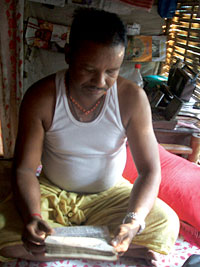 |
A bell chimes through the morning air at the Bhutanese refugee camp in Beldangi, Jhapa, waking a few residents. Pandit Arjun marches briskly out of his hut in Sector C, murmuring vedic hymns and wearing a saffron dhoti, a sacred thread and a holy mark on his forehead. This priest has in the last decade been the chief reciter of the Purana on 21 occasions, but he is a low-caste Biswokarma, a Dalit.
This is no ordinary scene, and how Arjun Biswokarma got to be here is a remarkable story of perseverance amidst the thwarted dreams of the refugee camps in Jhapa.
Eighteen years ago, Arjun Biswokarma was a farmer in Bhutan's Chirang district where for generations his family performed its caste-prescribed duty to make tools like khukuris and hoes. People from all around visited him to purchase these tools, yet few of his mostly high-caste customers dared enter his home, worried they would contract ritual impurities. Like other Dalits, Biswokarmas aren't allowed near high-caste people and as a result spend much of their lives in isolation within communities.
When as a child Arjun decided he wanted to study, he discovered he wasn't allowed to go to school where, school administrators worried, he would pollute his high-caste classmates. An insistent Arjun asked to be allowed to listen to the teachers from outside the classroom, at a distance from his classmates, but he was denied even this.
Bitter but desperate to learn, Arjun bought religious texts at an Indian market and studied them himself. A quarter of a century later, he has amassed an impressive collection of religious books, like the ancient Veda, from which he draws great inspiration.
A key discovery for Arjun has been the fact that these texts do not sanction the rigid, prejudical caste system that has currency today.
"The Puranas say that everyone is born an untouchable and rises up the caste system according to his or her merit. A brahmin is just a very wise person who knows the eternal truth." Supporting this interpretation, he says, is an old custom that deems all newborns impure. "Only after 11 days is it alright to drink water from the house in which a baby has been born."
Following rigorous independent religious study and a three-year scholarly stint in Kasi, Arjun established himself as a priest and a scholar, continuing his vocation in the refugee camp that has become his home. But he complains that very little has been done to help people like himself who have suffered caste-based discrimination. He's seen countless politicians preach caste equality and talk about bringing 'revolutionary' changes to people's lives, but few, he laments, have corrected their own prejudices. Even in this day and age, he says, people will clean their kitchen floors with cowdung if low-caste people have entered them.
What we need, he says, is less revolutionary talk and more well-targeted policies. He is especially worried about the ill-effects of alcohol and drugs.
"People are bad by habit, not birth. So we need to stay away from things like alcohol and drugs, which have ruined communities, including my own."


